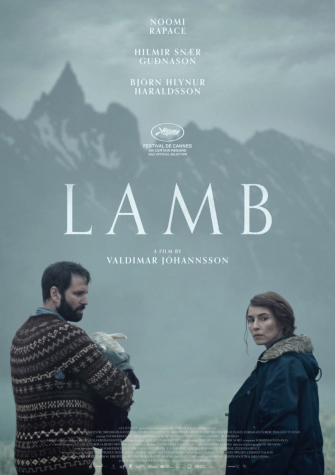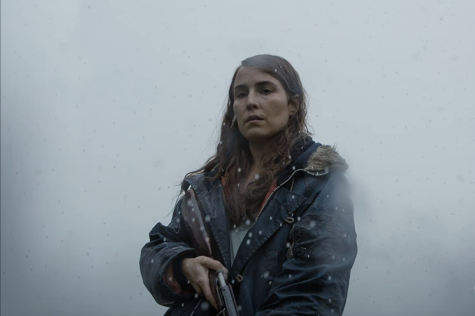REVIEW: A24’s ‘Lamb’ is a surreal and unnerving portrait of family dynamics
The Icelandic foreign language film “Lamb” brings nicheness and a foreboding atmosphere that fits in well with distributor A24’s filmography of diversely imaginative works. Director Valdimar Jóhannsson presents an idiosyncratic and visually mesmerizing vision of parenthood in this puzzling psychological drama.

The film focuses on Maria (Noomi Rapace) and Ingvar (Hilmir Snær Guðnason), a childless married couple who tend to a farm in Iceland. One night, one of their pregnant sheep goes into labor and gives birth to a lamb with abnormal features that are similar to a human’s. The two then decide to take the lamb away from its mother and raise it as their own daughter, named Ada. Ada is nurtured and raised as a human by the couple, which leads to the couple being constantly stalked by her actual mother. Their guardianship of the lamb is later criticized and ridiculed by Pétur (Björn Hlynur Haraldsson), Ingvar’s alcoholic brother who comes to stay with them. As the story progresses, Maria goes to extreme limits to maintain this parental dynamic.
It can be challenging to pinpoint a particular theme or message in the plot, but it is comparable to a folktale. Jóhannsson and co-writer Sjón, a frequent collaborator and lyricist for Icelandic singer Björk, craft a poetic slow-burn narrative that enforces ambiguity and leaves viewers to piece together clues to form their own meaning. One could possibly view the film as a piece that contemplates humankind’s interference with nature, regardless if the intentions of such meddling is good or bad. The decision for the couple to adopt Ada as their own, as well as her hybrid human and sheep attributes, upsets the order of natural selection. Though it’s not explicitly stated or shown, the implication of bestiality and Ada’s adoption creates an imbalance, as she’s unable to conform to one specific lifestyle due to her unnatural physical traits.

There are even instances where the couple’s guardianship over Ada can be seen as an oppressive act against natural forces. A sheep is mostly powerless against humans, as can seen in the film when Ada’s mother stands out the farmhouse window at night and bleats in what could be seen as a plea for Ada’s return to her mother. Maria and Pétur have the luxury of retaliation, the sheep does not. Which further lends to an oppressive dynamic.
The film does not particularly feel like a horror film in the vein of A24’s “Midsommar” or “The Witch,” but Eli Arenson’s moody cinematography contributes to an eerie sense of dread that plays with viewers’ expectations. The landscape shots of rural Iceland are notably stunning and act as a momentary visual escape from the film’s foreboding nature. The family shots are especially interesting, as a bizarre subversion of the traditional happy family. The most poignant shot is of Maria decorating a clothed Ada’s head with a flower crown, while sitting in a flower-surrounded field against the backdrop of the farmhouse and mountains in the distance. The absurd casualness of the shot reframes the odd human/lamb parent and child dynamic into a positive aspect that could easily change viewers’ perception and make them more empathetic to it. The film already has a strange premise, but it’s further enforced by the framing and mood of certain shots.

The potential barrier viewers may encounter, if they’re unfamiliar with the Icelandic language, does not hinder the small cast’s performances at all. Rapace is a remarkable performer here as a woman who’s desperate for a familial bond, regardless of the consequences. As Maria and Pétur had previously lost a child. Rapace channels a range of emotions to convey the character’s desperation. A particular highlight is her confrontation with Ada’s biological mother; in sharing the scene with the sheep as a near non-reactive scene partner, Rapace emits a fierce rage and frustration that can leave viewers rattled despite the situation’s ridiculousness. With such a small cast and given how she’s written as the closest thing to a focal character, Rapace and her performance are significant components to the film.
“Lamb” is a film that leaves a lot open to interpretation and basks in instances of ambiguity, which may leave viewers with more questions than answers. The film is a fascinating theatrical experience that may require multiple viewings to locate a definite meaning. Even with the vagueness it produces, “Lamb” is a surprising and visionary addition to A24’s lineup.








